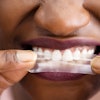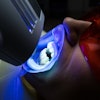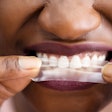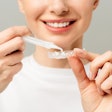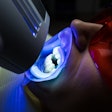The dark truth behind those bright smiles
OK, here's the part of the story you've been waiting for. Is cosmetic dentistry your road to riches?
On one hand, pay for dentists has never been better. According to surveys conducted by the ADA, average annual salaries for dental practitioners rose from $166,000 in 2000 to nearly $186,000 in 2004. The number of cosmetic procedures rose 12.5% over roughly the same period, according to surveys conducted by the American Academy of Cosmetic Dentistry (AACD).
Ipso facto, cosmetics must good for your bottom line, right?
Not necessarily. While dental incomes are rising -- and cosmetic procedures certainly add to the kitty -- the main reason dentists make more money is that the ratio of dentists to the general population has been dropping since the 1980s, according to Boston University's Nathanson. There are more sick teeth and relatively fewer people to fix them.
Another limiting factor is insurance. Purely cosmetic treatments, such as veneers or teeth whitening, are generally not covered by insurance. That means patients must foot the bill themselves or finance the work through third parties like CareCredit or Dental Fee Plan (a Capital One credit card used to pay for dental work). Nearly 82% of dentists offer third-party financial help, according to the AACD.
The good news for dentists is that instead of getting paid a percentage of your fees by a PPO or insurance plan, you'll usually get paid in full, said Dr. Charles Blair, a practice management consultant in Charlotte, NC, and author of Coding with Confidence: The "Go-To" Guide for CDT-2007/2008.
The bad news: cosmetic dentistry is more sensitive to fluctuations in the market. When the national economy hits a tailspin, everyone has fewer reasons to smile -- or to pay $500 to whiten their teeth.
The inconvenient truth? "If you're doing cosmetic dentistry right, you're probably not making a lot of money," said Dr. Larry Addleson. For one thing, doing it right means using higher quality -- and more expensive -- labs.
"You can get a crown or veneer made in an offshore lab for $100, or you can pay a master ceramist $600," he said. "If the veneer costs you $100 and you charge the patient $800, you can make more money. But you can't charge six times as much for a $600 veneer and expect to remain competitive."
You must also be willing to send things back to the lab for a do-over -- or several do-overs -- until you and the patient are satisfied. Whether dentists can recoup the added costs depends on their relationship with both the lab and their patients, Kelly said, but the same market rules apply.
"You have to be willing to reject things that most dentists would say are beautiful," said Dr. David Landau. "When a cosmetic case comes back from the lab we call it a 'first fitting,' not delivery of the final product. Every time you do a fitting and reject the work, you lose money."
Doing it right means also taking more time to work with patients, especially when dealing with complex cases. It can mean spending more time and money for continuing education, and paying more for qualified staff.
Cosmetic dentists also incur greater advertising costs, according to Blair. "Pure cosmetic dentists typically spend 7% to 10% of their gross on advertising, versus around 1% for most general dentists," he said.
In his 25 years of consulting, Blair said he's seen a handful of GDs give up bread and butter dentistry and focus entirely on cosmetic work, but few end up sticking with it.
"Some people have walked the plank, gotten out of the PPOs and regular insurance plans, and tried to specialize only in cosmetics," he said. "But I've seen some stumbling there. Many have had to run back to general dentistry. I caution dentists to maintain their bread and butter practice and let cosmetics be the gravy."
For dentists like Addleson, money isn't the motivator. It's about raising the overall quality of dental work for his community as a whole -- one reason why he's a director of the San Diego Advanced Study Group and currently mentoring 10 dentists in his area.
"If you're really committed to cosmetic dentistry, you're not going to get rich," he said. "It's an inner passion. Yesterday doesn't matter. You're only as good as what you do today. It's like trying to understand why Van Gogh cut off his own ear. It's hard for people who don't share this passion to understand."
Freelance writer Dan Tynan prefers his dentists at a distance -- preferably over the phone.
To read Part I: So you wanna be a cosmetic dentist, click here.
